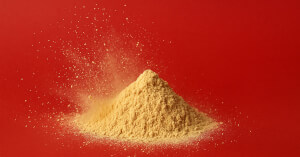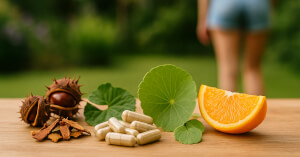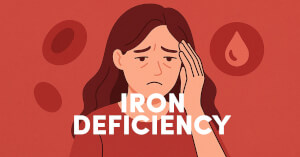
Fertility Supplements for Women: What to Take When Trying to Conceive

Trying to conceive can feel like a rollercoaster, equal parts hope, anticipation, and sometimes frustration. While lifestyle changes and medical care remain at the heart of fertility planning, there’s a growing interest in vitamins and supplements that may support reproductive health. Can the right nutrients really make a difference? Research suggests they can. From boosting egg quality to balancing hormones, certain fertility supplements for women provide key building blocks for conception.
Below, we’ll walk through the most important supplements to consider, plus special recommendations after miscarriage, for women over 40, and for those managing PCOS.
Why Supplements and Vitamins Matter for Fertility
Fertility is influenced by more than just hormones and ovulation, it’s also deeply tied to nutrition. Every egg cell is packed with mitochondria, antioxidants, and DNA that need proper nourishment. Vitamins and minerals act like tiny workers behind the scenes: they stabilize cell membranes, regulate cycles, and even affect implantation.
That’s why deficiencies, whether in vitamin D, folate, or omega-3 fatty acids, can throw the system off balance. While a wholesome diet is the foundation, targeted supplements can bridge nutritional gaps and give your body a fertility-friendly environment.
Core Fertility Supplements Every Woman Should Consider
Folic Acid (Folate)
Folic acid is the undisputed star of preconception care. It not only prevents neural tube defects in early pregnancy but also supports healthy ovulation. Folate helps in DNA synthesis and repair, meaning your eggs have a better chance of maturing properly. Women often start folate months before trying to conceive, and for good reason.
✔️ How to use it: 400–800 mcg daily. Start at least three months before conception attempts.
Vitamin D3
Vitamin D is sometimes called the “sunshine hormone,” but many women are deficient, especially in northern climates. Low vitamin D has been linked to irregular cycles, ovulatory issues, and even lower IVF success rates. It also plays a role in immune balance, which matters when an embryo is trying to implant.
✔️ How to use it: 1000–2000 IU daily, or as recommended after a blood test.
Omega-3 Fatty Acids
Omega-3s, found in fish oil or algae oil, reduce inflammation and help regulate hormones like prostaglandins. That balance can improve cervical mucus, ovulation, and overall reproductive health. Plus, omega-3s prepare the body for pregnancy by supporting brain development in the future baby.
✔️ How to use it: 1000 mg daily (combined EPA + DHA). Choose high-quality, purified sources.
Coenzyme Q10 (CoQ10)
CoQ10 is like rocket fuel for egg cells. As women age, the mitochondria in eggs become less efficient. CoQ10 helps restore energy production, potentially improving egg quality. It’s particularly recommended for women over 35, but even younger women benefit from its antioxidant effects.
✔️ How to use it: 100–300 mg daily, taken with meals that contain fat.
Iron and B Vitamins
Iron supports oxygen transport, while B vitamins (especially B6 and B12) regulate hormones and energy. Low levels of these nutrients can lead to fatigue, irregular cycles, and even early miscarriage risk. Many prenatal vitamins combine them for comprehensive coverage.
✔️ How to use it: Found in most prenatal vitamins. Aim for 18–27 mg iron and balanced B-complex daily.
Fertility Supplements After Miscarriage
After a miscarriage, the body goes through both physical and emotional recovery. Supplements here aren’t just about fertility, they’re about healing. Folate and iron help replenish blood and tissues. CoQ10 and antioxidants support cellular repair, while omega-3s calm inflammation.
Women often ask: how soon can I try again? Medical advice varies, but supporting your nutrient reserves before conceiving again is wise. It’s not just about “trying quickly,” it’s about giving your body the building blocks it needs to carry a healthy pregnancy.
Fertility Supplements for Women Over 40
Age is the biggest factor in female fertility, but it’s not the end of the story. Women over 40 may still conceive, though egg quality and ovarian reserve decline. Supplements here focus on protecting the eggs that remain.
- CoQ10 becomes essential for mitochondrial energy.
- Vitamin D helps regulate cycles and bone health.
- Antioxidants like vitamin C and vitamin E can reduce oxidative stress.
It’s true that supplements can’t reverse time, but they may support egg health and improve the chances of success, especially alongside medical fertility treatments.
Fertility Supplements for Women with PCOS
PCOS (polycystic ovary syndrome) affects millions of women worldwide and is one of the most common causes of infertility. The condition is linked to insulin resistance and hormonal imbalance, two things that supplements can help manage.
Myo-Inositol and D-Chiro-Inositol
These natural compounds act almost like insulin sensitizers, helping restore ovulation in women with PCOS. Studies show they can improve egg quality, regulate cycles, and even enhance IVF outcomes.
✔️ How to use it: Typical doses range from 2–4 g daily, often in a ratio of 40:1 myo-inositol to D-chiro-inositol.
Vitamin D
Vitamin D deficiency is more common in women with PCOS and may worsen insulin resistance. Supplementing can help normalize cycles and support metabolic balance.
✔️ How to use it: 1000–2000 IU daily, adjusted based on blood test results.
Omega-3 and NAC
Fish oil and N-acetylcysteine (NAC) may improve insulin sensitivity and reduce androgen excess. For many women, this translates into more regular cycles, and more chances to conceive naturally.
✔️ How to use it: Omega-3: 1000 mg daily. NAC: 600–1200 mg daily, ideally under medical guidance.
Natural Herbs and Botanicals for Fertility
Supplements aren’t only about vitamins and lab-made capsules. Herbal remedies have been part of fertility traditions for centuries. Some women swear by them, others remain skeptical. The truth probably lies in between.
- Maca root may improve libido and balance hormones.
How to use it: 1–3 g daily in capsule or powder form.
- Vitex (Chasteberry) influences pituitary hormones, potentially improving luteal phase support.
How to use it: 20–40 mg extract daily. Effects may take several cycles.
- Ashwagandha may reduce stress and cortisol, which indirectly supports reproductive balance.
How to use it: 300–600 mg standardized extract daily.
These herbs aren’t magic bullets. But when combined with core vitamins, they can round out a fertility-focused regimen.
What to Avoid and Precautions
Not every supplement is fertility-friendly. Some “natural” products can interfere with medications or even harm pregnancy. For example, high-dose vitamin A (retinol) is risky in pregnancy, while certain herbs like Black Cohosh should be avoided without medical supervision.
A few guidelines:
- Stick to proven nutrients (folate, vitamin D, omega-3, CoQ10).
- Be cautious with exotic herbs unless guided by a professional.
- Always check supplement quality, third-party tested brands are safest.
Remember, more isn’t always better. The key is balance.
Conclusion
Fertility isn’t something we can fully control, but we can create conditions that give us the best shot. Supplements and vitamins for women trying to conceive play a supportive role, helping eggs mature, hormones balance, and bodies recover from challenges like miscarriage or PCOS.
Whether you’re in your twenties preparing for your first baby, navigating fertility after 40, or managing PCOS, targeted supplementation can be part of the journey. Pair them with healthy eating, movement, and stress management, and don’t hesitate to talk with your doctor before starting.
Because while supplements can set the stage, conception is always a mix of science, timing, and a touch of mystery.
FAQ about Fertility Supplements for Women
What vitamins help with female fertility?
Key vitamins and nutrients for fertility include folate, vitamin D, omega-3 fatty acids, B vitamins, iron, and CoQ10. They support ovulation, egg quality, hormone balance, and implantation. Testing vitamin D is helpful to personalize dosing. Always speak with a healthcare professional before starting supplements.
What are the best fertility supplements after miscarriage?
After miscarriage, many clinicians suggest a high quality prenatal with folate, plus iron if needed, vitamin D, omega-3s, and antioxidants such as CoQ10 to support cellular repair. Give your body time to recover and ask your doctor about timing for trying again and any lab checks that make sense for you.
Which fertility supplements help women over 40?
For women over 40, CoQ10 is commonly used to support mitochondrial function and egg quality, with typical ranges of 200 to 300 mg daily. Vitamin D, omega-3s, and antioxidants like vitamin C and E can also help reduce oxidative stress. Supplements are supportive, not a guarantee, so pair them with medical guidance.
What fertility supplements help women with PCOS?
Myo-inositol combined with D-chiro-inositol is often used to improve insulin sensitivity and promote ovulation in PCOS. Vitamin D, omega-3s, and NAC may also support cycle regularity. Nutrition, movement, sleep, and weight management remain important. Discuss dosing and interactions with your clinician.
How long do fertility supplements take to work?
Ovarian follicles mature over roughly 90 days, so many people target 2 to 3 months of consistent supplementation before expecting changes. With PCOS or after miscarriage, progress may take several cycles. Track cycles and symptoms, and review your plan if nothing changes after 3 to 6 months.
Can I take a prenatal vitamin with CoQ10 and inositol?
In many cases yes, since they act on different pathways. Choose a prenatal with folate, watch total vitamin A from retinol, and separate doses if you feel nauseous. If you take other medications or have a medical condition, confirm safety and dosing with your healthcare provider.
This article was originally published on Stackbb, your trusted source for science-based supplement guides.






